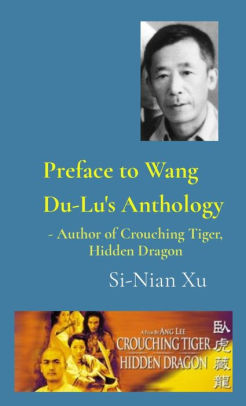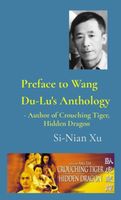- Welcome to FictionDB, Guest
- | My Account
- | Help

Preface to Wang Du-Lu's — Multiple Authors
Wang Du-Lu was a writer who was once forgotten. Many people in mainland China recalled him or just knew his name only because of the Academy Award-winning film "Crouching Tiger, Hidden Dragon". However, watching the film is certainly no replacement for reading the original! and without reading the novel.
Wang Du-Lu is the founder of knight-errant and tragic romance novels in China. The first novel Wang consciously wrote with this style was "Precious Sword, Golden Hairpin". Although this was the first one, it was a ground-breaking master-piece work based on his many years' profound accumulation of fine products of social, romance and Wuxia, hence, the author had established his indisputable status as the founding master of novels of this style.
The male and female knight warriors in these love stories had superb martial arts skills, but they were only human beings, not supermen. When the author didn't give them a great task of protecting the country or saving the people, but only let them to fight to defend the "right to love", they were often fearful, troubled, hesitant or indecisive on how to deal with the love life. Although they were invincible in Jianghu, and they dared to violate the law by force if necessary, they had scruples about breaking their own moral law. Eventually, they found that the most terrifying "enemy" they faced were themselves. In Wang's social novels, tragedy often occurred to the weak who was living in lower-class, while in his knight-errant and tragic romance novels, the strong, i.e. a knight-errant, often suffered a tragedy which was tragedy of the heart.
Wang Du-Lu expressed his preference for "tragic ending" over "happy ending". He wrote: "Nothing is perfect. Flaw is always a part of beauty. A 'perfect ending' is always less memorable than 'a beauty with a flaw'". Besides, life is always bitter, how could there be so many perfect things?" The "flaws" in "Dancing Crane, Singing Phoenix" and "Colorful Phoenix, Silver Snake" were the death of the heroines and the sadness of the heroes; in "Precious Sword, Golden Hairpin", "Crouching Tiger, Hidden Dragon", and "Iron Knight, Silver Vase", the "flaws" were not the death of the hero or heroine, but rather their heart wounds that will never heal; while in "The Double Dragon Sword" and "A Hero at Luoyang", Wang used a touch of comedic light to antithesise their pathos.
Wang made a great contribution to the Chinese martial arts literature. The elevation of Wuxia-romance novels to the realm of profoundly psychological tragedy literature by Wang was a great contribution to the Chinese martial arts fiction. Just like Sigmund Freud once indicated: "The painful struggle between different impulses was carried on in the mind of the protagonist. At the end of the struggle was not the death of the protagonist, but rather the suppression of one of these impulses". Although this impulse "disappeared" because of the protagonist's renunciation, the turbulent waves of sorrow were always hidden deep in his/her heart for the rest of his/her life.
Wang Du-Lu is the founder of knight-errant and tragic romance novels in China. The first novel Wang consciously wrote with this style was "Precious Sword, Golden Hairpin". Although this was the first one, it was a ground-breaking master-piece work based on his many years' profound accumulation of fine products of social, romance and Wuxia, hence, the author had established his indisputable status as the founding master of novels of this style.
The male and female knight warriors in these love stories had superb martial arts skills, but they were only human beings, not supermen. When the author didn't give them a great task of protecting the country or saving the people, but only let them to fight to defend the "right to love", they were often fearful, troubled, hesitant or indecisive on how to deal with the love life. Although they were invincible in Jianghu, and they dared to violate the law by force if necessary, they had scruples about breaking their own moral law. Eventually, they found that the most terrifying "enemy" they faced were themselves. In Wang's social novels, tragedy often occurred to the weak who was living in lower-class, while in his knight-errant and tragic romance novels, the strong, i.e. a knight-errant, often suffered a tragedy which was tragedy of the heart.
Wang Du-Lu expressed his preference for "tragic ending" over "happy ending". He wrote: "Nothing is perfect. Flaw is always a part of beauty. A 'perfect ending' is always less memorable than 'a beauty with a flaw'". Besides, life is always bitter, how could there be so many perfect things?" The "flaws" in "Dancing Crane, Singing Phoenix" and "Colorful Phoenix, Silver Snake" were the death of the heroines and the sadness of the heroes; in "Precious Sword, Golden Hairpin", "Crouching Tiger, Hidden Dragon", and "Iron Knight, Silver Vase", the "flaws" were not the death of the hero or heroine, but rather their heart wounds that will never heal; while in "The Double Dragon Sword" and "A Hero at Luoyang", Wang used a touch of comedic light to antithesise their pathos.
Wang made a great contribution to the Chinese martial arts literature. The elevation of Wuxia-romance novels to the realm of profoundly psychological tragedy literature by Wang was a great contribution to the Chinese martial arts fiction. Just like Sigmund Freud once indicated: "The painful struggle between different impulses was carried on in the mind of the protagonist. At the end of the struggle was not the death of the protagonist, but rather the suppression of one of these impulses". Although this impulse "disappeared" because of the protagonist's renunciation, the turbulent waves of sorrow were always hidden deep in his/her heart for the rest of his/her life.
Genres
Click on any of the links above to see more books like this one.

